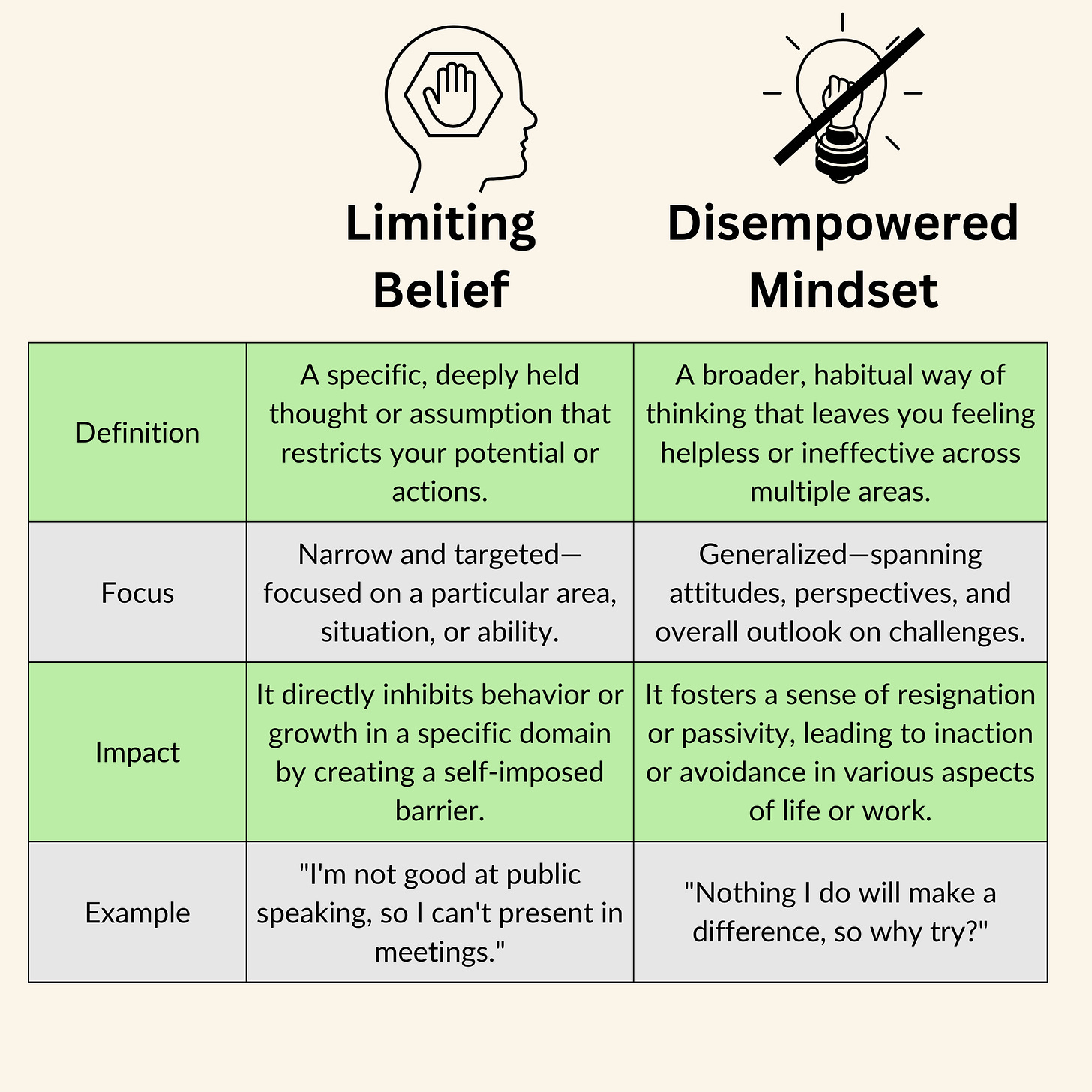Limiting Beliefs vs. Disempowered Mindsets
Your patterns of thinking may be holding you back
When we feel stuck, it can be hard to pinpoint the source of our struggle. Are we held back by the stories we tell ourselves or by a deeper, more pervasive way of thinking? To grow, it’s essential to differentiate between a limiting belief and a disempowered mindset. Both can hinder progress but in distinct ways.
What is a Limiting Belief?
A limiting belief is a specific thought or assumption that restricts what we think we can achieve. These beliefs often sound like absolutes:
“I’m not good at math.”
“I can’t lead a team.”
“I’m not creative enough for this job.”
These statements may seem small, but they shape our actions—or lack thereof. Limiting beliefs often stem from past experiences, social conditioning, or fear of failure.
What is a Disempowered Mindset?
A disempowered mindset is broader than a single belief. It is a pervasive pattern of thinking that erodes our sense of agency, control, and efficacy. While limiting beliefs are about what we can’t do, a disempowered mindset makes us feel like we’re not in control of our lives at all.
Some common disempowered mindsets include:
Victim Mindset: Believing that external circumstances dictate outcomes (“Nothing I do will matter because the system is broken.”).
Fixed Mindset: Viewing abilities as static, which stifles growth and effort (“I’m just not a natural leader, so why try?”).
Scarcity Mindset: Operating from a place of fear and lack (“There’s not enough time, resources, or support for me to succeed.”).
The Key Difference
A limiting belief is specific and isolated; it’s about one thing you think you can’t do. A disempowered mindset, on the other hand, is systemic. It’s about how you approach challenges as a whole.
In essence, limiting beliefs are like roadblocks in specific lanes, while a disempowered mindset creates gridlock across the entire highway.
A Case Study: The Teacher Who Detached
Let’s bring this to life with an example.
Meet Ms. Taylor, a middle school science teacher known for her creativity and energy—until recently. Over time, her workload, unresponsive students, and lack of support from leadership wore her down. She began showing signs of disempowerment:
She has recently started ignoring behavioral issues in her classroom because she felt they weren’t worth addressing.
The last time she turned in lesson plans was 2 months ago.
She stopped actively participating in PLC meetings. She used to offer to plan with other people, but now she barely talks about what she is doing in the classroom.
Underneath this behavior, Ms. Taylor carried a limiting belief: “No matter how hard I try, I’ll never be a great teacher.”
This belief fed into a disempowered mindset that colored her entire experience. She stopped believing in her ability to influence her students, her classroom, or even her career.
Shifting From Disempowerment to Empowerment
Breaking free from limiting beliefs or a disempowered mindset isn’t easy, but it’s possible with awareness and intentionality.
Here’s how Ms. Taylor began to shift:
Name the Limiting Belief: With her instructional coach, she identified her limiting belief (“I’ll never be great”) and began challenging its validity.
Reframe the Narrative and Get Narrow: Instead of focusing on perfection, she set smaller, attainable goals, like improving transitions between activities.
Build Confidence Through Action: As she implemented new strategies and saw small wins, her belief in her ability to influence her students grew.
Practical Takeaways
For Limiting Beliefs: Ask yourself, “Is this thought based on evidence or fear?” and take one small action to challenge it.
For Disempowered Mindsets: Reflect on your overall patterns of thinking. Are you stuck in blame, apathy, or overcompensation? What would regaining control look like?
When we can name what’s holding us back, we can take action to move forward—one belief, one mindset, one step at a time.
Let’s talk! What limiting beliefs or disempowered mindsets have you encountered in your life or work?





Great post Jo! I think the example you provided is all too common. Especially with leadership that isn't that supportive!
I'd also say that for some children, their limiting beliefs may come from, or are compounded by, staff members who consistently label them as "disruptive" or "poorly behaved" etc.